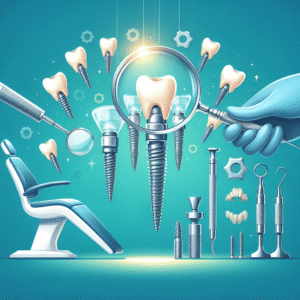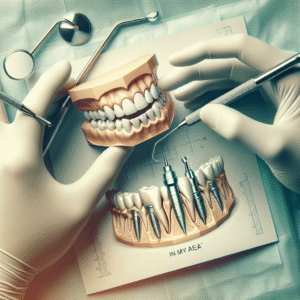For individuals suffering from extensive tooth loss or severe dental decay, the All-on-4 dental implant procedure offers a revolutionary solution. This advanced technique provides a stable, permanent foundation for Full-Arch Dental Implants, often allowing patients to leave the clinic with Teeth-in-a-Day / Same-Day Implants. Unlike traditional dentures, Implant-Supported Dentures anchored by the All-on-4 method deliver superior comfort, functionality, and aesthetics.
In this detailed guide, we will walk you through the step-by-step process of the All-on-4 dental implant procedure, including specialized techniques like Zygomatic Implants for patients with insufficient bone density and the role of Bone Grafting for Dental Implants when necessary.
Understanding the All-on-4 Concept
The All-on-4 technique involves strategically placing four dental implants in the jawbone to support a full arch of prosthetic teeth. These implants are positioned at precise angles to maximize contact with available bone, often eliminating the need for extensive Bone Grafting for Dental Implants. This approach is particularly beneficial for patients who have experienced significant bone loss and want to avoid lengthy recovery periods.
Step 1: Initial Consultation and Treatment Planning
The journey begins with a thorough consultation with a qualified implant dentist or oral surgeon. During this visit, the dentist will:
- Evaluate your oral health, including gum condition and bone density.
- Take 3D scans or X-rays to assess jawbone structure.
- Discuss your medical history to identify any contraindications.
- Determine if you are a candidate for traditional implants or require Zygomatic Implants (longer implants anchored in the cheekbone for patients with minimal upper jawbone).
If bone loss is detected but not severe enough for zygomatic implants, Bone Grafting for Dental Implants may be recommended to strengthen the jawbone before proceeding.
Step 2: Preparing for Surgery
Once the treatment plan is finalized, the surgical phase is scheduled. Pre-operative instructions may include:
- Avoiding food and drink for a specified period before surgery.
- Arranging for transportation post-surgery due to sedation effects.
- Taking prescribed antibiotics or antimicrobial mouthwash to reduce infection risks.
Step 3: Surgical Placement of Implants
On the day of surgery, the patient is administered local anesthesia or sedation for comfort. The procedure follows these key steps:
- Tooth Extractions (if necessary): Any remaining damaged teeth are removed.
- Implant Placement: Four titanium implants are surgically inserted into the jawbone—two vertically in the front and two angled in the back for optimal stability.
- For patients with extreme bone atrophy, Zygomatic Implants may be placed in the upper jaw, bypassing the need for bone grafting.
- Temporary Prosthesis Attachment: In many cases, a temporary set of Implant-Supported Dentures is attached the same day, fulfilling the Teeth-in-a-Day / Same-Day Implants promise.
Step 4: Healing and Osseointegration
After implant placement, the healing process begins. Over the next 3-6 months, the implants fuse with the jawbone through osseointegration, ensuring a strong foundation. During this phase:
- Patients must follow a soft-food diet to avoid disturbing the implants.
- Proper oral hygiene is critical to prevent infect
Step 5: Final Prosthesis Placement
Once osseointegration is complete, the temporary dentures are replaced with a custom-made, permanent set of Full-Arch Dental Implants. These prosthetics are:
- Crafted from high-quality materials like zirconia or acrylic for durability and natural appearance.
- Designed to match the patient’s bite alignment and facial structure.
Step 6: Post-Procedure Care and Maintenance
To ensure the longevity of your Implant-Supported Dentures, adhere to these guidelines:
- Brush and floss daily, using interdental brushes for hard-to-reach areas.
- Schedule bi-annual dental check-ups for professional cleanings and implant inspections.
- Avoid habits like smoking or chewing hard objects that could damage the implants.
Advantages of the All-on-4 Procedure
- Minimally Invasive: Often avoids the need for Bone Grafting for Dental Implants.
- Quick Results: Teeth-in-a-Day / Same-Day Implants restore function immediately.
- Cost-Effective: Fewer implants reduce overall treatment expenses.
- Enhanced Quality of Life: Full-Arch Dental Implants improve chewing, speech, and confidence.
Potential Challenges and Considerations
While the All-on-4 method is highly successful, certain factors may influence outcomes:
- Bone Density Issues: Patients with severe bone loss may still require Zygomatic Implants or grafting.
- Adjustment Period: Some patients need time to adapt to the new prosthesis.
- Maintenance Requirements: Though durable, implants require diligent care.
Conclusion
The All-on-4 dental implant procedure is a groundbreaking solution for full-mouth restoration, combining efficiency, stability, and aesthetics. By leveraging techniques like Zygomatic Implants and minimizing the need for Bone Grafting for Dental Implants, this approach makes Teeth-in-a-Day / Same-Day Implants a reality for many. Whether you opt for Implant-Supported Dentures or fixed Full-Arch Dental Implants, the result is a confident smile and restored oral function.
If you’re considering this life-changing treatment, consult with an experienced implant specialist to determine the best path forward for your dental health.
Frequently Asked Questions
FAQ: All-on-4 Dental Implant Procedure Steps
1. What is the All-on-4 dental implant procedure?
The All-on-4 procedure is a dental implant technique that replaces a full arch of teeth using just four strategically placed implants. It provides a permanent, stable solution for patients with missing or failing teeth.
2. How long does the All-on-4 procedure take?
The entire process, including consultation, surgery, and recovery, typically takes a few months. However, temporary teeth are often placed on the same day as the implant surgery.
3. Is the All-on-4 procedure painful?
Discomfort is minimal as the procedure is performed under anesthesia. Most patients report mild soreness after surgery, which can be managed with prescribed pain medication.
4. What are the benefits of All-on-4 implants over traditional dentures?
All-on-4 implants offer better stability, improved chewing function, and a natural appearance. Unlike dentures, they prevent bone loss and do not require adhesives or frequent adjustments.




